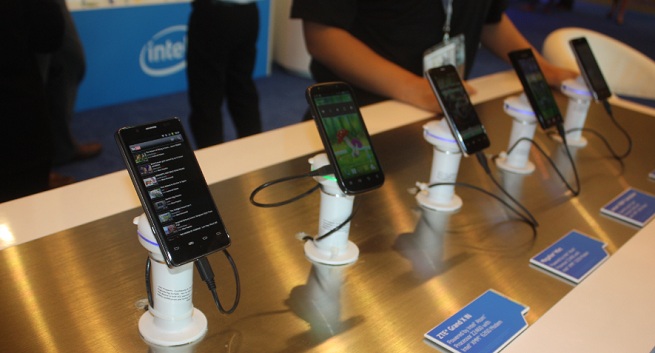
“What did Intel say that was new today?” asked Danielle Levitas, an analyst at IDC. “This is about mindshare, and they don’t have it.”
The PC has taken a hit because of the popularity of Apple’s iPad tablet. By 2015, tablet shipments are expected to exceed PC shipments, according to NPD.
AI Weekly
The must-read newsletter for AI and Big Data industry written by Khari Johnson, Kyle Wiggers, and Seth Colaner.
Included with VentureBeat Insider and VentureBeat VIP memberships.
One way the PC has survived so long is that it has gobbled up the functions of devices that competed with it. It can play games, and so you don’t need a dedicated game console. And so on. Intel is laboring hard to pack a lot of new technologies into PCs of the next year or so.
PC makers are showing a bunch of “convertible” machines that are laptops you can convert into tablets. But Kevin Krewell, a senior analyst at The Lynley Group, said he wasn’t too impressed with such machines. They make for cool demos, but they’ll carry extra costs that users won’t want to pay for.
In some ways, Apple and Intel are brethren, as Intel chips are in every Mac computer. In other ways, Apple and Intel compete directly. Apple makes its own ARM-based chips for the iPad and iPhone, and it shows no sign of being interested in Intel’s latest low-power phone and tablet chips. Intel says that 20 Intel-based Windows 8 tablets are under design, but that doesn’t mean much. So far, the quality of Apple’s offerings has put to shame the larger quantity of rival tablets. This is one reason why Apple’s market capitalization is about six times larger than Intel’s these days.
Intel showed off five Intel-based phones from customers such as Lenovo and Orange. But Levitas said she was stunned that Intel didn’t have any new customers to announce for its phone chips, even though it has been selling the chips for much of the year.
To be fair, Intel showed a lot of things that could be cool in the next year or so, like its “perceptual computing” project that will combine finger recognition, voice controls, face recognition, and touchscreens for controlling laptops of the future. And Intel showed off a working version of a low-power fourth-generation Core chip code-named Haswell. The chip will arrive in the next generation of Ultrabooks next year, and it will have an interesting 10-watt version for new kinds of devices. And there is always the chance that Microsoft will show off more cool gear for the PC when Windows 8 ships.
“Intel hasn’t shown anything yet that will steal the limelight from Apple today,” said Patrick Moorhead, an analyst with Moor Insights & Strategy. “But with Intel’s perceptual computing, they could do it in the future. Apple will own the day tomorrow, which is why Intel rolled out Haswell and perceptual computing today. ”
[aditude-amp id="medium1" targeting='{"env":"staging","page_type":"article","post_id":529449,"post_type":"story","post_chan":"none","tags":null,"ai":false,"category":"none","all_categories":"business,mobile,","session":"B"}']
Perhaps the only way that Apple could lose the PR war with Intel is if it has equally boring products tomorrow. Martin Reynolds, vice president at Gartner, said that the iPhone and iPad were transformational products, but he believes that future products may be “incremental.”
“It’s not clear what we’re going to see that is exciting from Apple,” he said.
We’ll find out tomorrow. It’s Apple’s game to lose at this point.
VentureBeat's mission is to be a digital town square for technical decision-makers to gain knowledge about transformative enterprise technology and transact. Learn More
